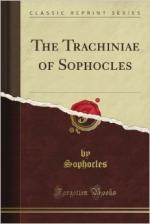|
This section contains 278 words (approx. 1 page at 400 words per page) |

|
Women of Trachis: Trachiniae Summary & Study Guide Description
Women of Trachis: Trachiniae Summary & Study Guide includes comprehensive information and analysis to help you understand the book. This study guide contains the following sections:
This detailed literature summary also contains Bibliography on Women of Trachis: Trachiniae by Sophocles.
One of the greatest tragedians of ancient Greece, Sophocles has remained the standard by which other playwrights are judged since his works were rediscovered during the western European Renaissance. He is the author of one of the most famous plays of all time, Oedipus the King, and a monumental figure from the so-called golden age of drama in classical Athens. Of the small fraction of his works that have survived the ages, however, not all are focused exclusively on male tragic heroes. In fact, Sophocles was able to probe sensitively and thoughtfully into the women's world that awaited these figures at home and was closely and complexly bound together with a hero's fate. Women of Trachis is one of these plays, focusing for the first two-thirds of its action not on the epic hero Heracles but on the suffering of his wife Deianira.
Also translated as Trachiniae or Trachinian Women, the play is commonly supposed to have been written and performed during Sophocles's early period, between approximately 440 and 430 b.c.e. The work has long startled audiences because of its unsympathetic portrayal of the mighty son of Zeus, Heracles, known as Hercules in ancient Rome and often called by that name in modern times. It has also puzzled critics who assume that Greek tragedy should have a single tragic hero because it places Deianira in this role only to kill her off with much of the play left to run. Women of Trachis has been widely published in various editions, but an able rendering of the drama in verse is available in Sophocles, 1, translated by Brendan Galvin and published by the University of Pennsylvania Press in 1998.
Read more from the Study Guide
|
This section contains 278 words (approx. 1 page at 400 words per page) |

|



